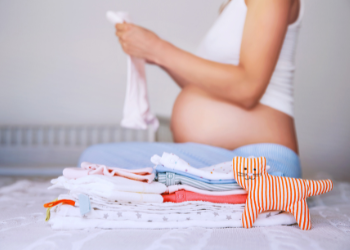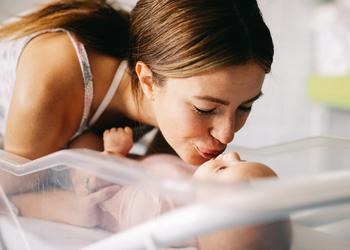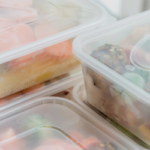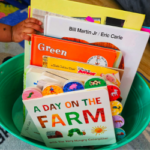Preparing For Baby: 25 Things To Do Before Baby Arrives
The time has come for you to prepare for the arrival of the new addition to your family. But the question is, with so much to do, what do you do, and where do you start?
As overwhelming as prepping for a baby may be, you can get it done if you take a deep breath and start one task at a time.
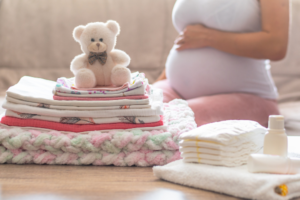
No matter how prepared you are, you’ll never feel one hundred percent ready for your baby’s arrival. Do as much as you can before your baby arrives because it might be more challenging to get things done once the baby is here.
Don’t stress yourself into early labor by trying to get everything done all at once. The goal is to prioritize and complete the essential tasks on your list first. If you don’t get to the other stuff on the list, that’s okay. You can always get it done later. And don’t forget to ask for help if you need it.
*This post contains affiliate links, at no additional cost to you I am compensated if you purchase after clicking on the links.*
25 Things To Do Before Baby Arrives
1) Have your baby shower:
I am sure you created and have been adding items to your baby registry since the first trimester. Now is the time to celebrate your pregnancy and the arrival of your new love. So dress up and look cute for your big day. Enjoy being showered and pampered with love from close friends and family. You deserve it!
2) Finalize your baby’s name:
You want a perfect and meaningful name for your baby. A name that is classy yet screams your baby is special. Now that your baby is almost here, it’s time to finalize your baby’s name, especially if you want to add your baby’s name to the nursery or purchase a couple of personalized gifts for your newborn.
3) Set up nursery:
Now that you have had your baby shower, it’s time to set up your baby’s nursery. Make the nursery as comfortable as possible as you will spend a lot of time there. Also, keep in mind that for the first couple of months, your baby will be sleeping quite a bit, make sure that the nursery is sleep-friendly for your baby. Follow sleep safety guidelines to ensure that your baby is always safe while sleeping.
4) Prewash and organize your baby’s clothes:
Even if your baby’s clothes are brand new, it is very important that you prewash their clothes. Newborn babies tend to have very sensitive skin. Washing all of your baby’s clothes will ensure that all chemicals, irritants, dirt, and dust are removed. A general rule of thumb is to wash your baby’s about 4-6 weeks before your due date. Try not to wash your baby’s clothes too early so it doesn’t accumulate dirt and dust.

5) Clean out your car:
Again, a baby’s skin is sensitive and can easily be irritated by dust, which is why it is just as important for you to clean your mom-mobile before installing your baby’s car seat.
6) Install your baby’s car seat:
If you are a first-time mom, know that you will not be able to leave the hospital without a safe car seat. Since you don’t know if your baby might come early, install your baby’s car seat a 2-3 weeks before your due date just in case you go into early labor.
7) Deep clean your home:
Clean and tidy up your home before your baby arrives. A dirty home can make your baby sick by exposing them to unwanted allergens, bacteria, and viruses. Research has shown that exposing your child to pollutants at a young age can put them at risk for chronic illnesses such as asthma, ADHD, and cancer. Deep cleaning your home before your baby arrives destroys bacteria and viruses and creates a clean, safe, and healthy environment for them to thrive.
8) Get your free breast pump through your insurance company:
Around your 28th-week visit with your provider, you should receive a prescription for a free breast pump. Be sure to complete the prescription form and send it to your insurance company so you can receive your free breast pump as soon as possible.
9) Choose a pediatrician:
You should also be aware that your discharge from the hospital will be delayed if you don’t have an appointment set up with a pediatrician for your newborn baby a few days post-discharge. If you are a second or third-time mom, this process is easy as you are allowed to use the same pediatrician you have for your other kids. If this is your first rodeo, you may have to research and ask around to find a provider that fits your and your family’s needs.
10) Have baby formula ready:
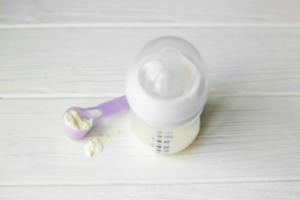
Have a container of baby formula ready even if you are planning on breastfeeding. Breastfeeding is obviously the best way to nourish your baby. However, some things are out of your control and may not go as planned. Have baby formula ready in case life happens, and you are having difficulty breastfeeding.
11) Stock up on diapers:
You are going to need quite a few diapers in the first few months of your baby’s arrival. Stock up on diapers and set up your changing stations around the house. Don’t forget to have a diaper-changing portable caddy ready for your car.
12) Prepare for breastfeeding:
Prepare yourself physically and mentally for breastfeeding. Purchase the necessary items, such as a breast pump, haakaa, bottles, and breastmilk storage essentials. Breastfeeding is much less stressful when you have the things you need to help you succeed. Also, prepare yourself mentally. Breastfeeding is a demanding part of early motherhood. Mentally prepare yourself by gaining confidence and believing in your ability as a mom to nourish your baby.
Remember to sterilize your baby bottles and breastfeeding pump parts right before the arrival of your new baby. Setting up a couple of pumping and nursing stations around your home is also wise.
13) Pre Register at the hospital you plan to deliver:
Before your big day, tour the hospital you plan to give birth at and pre register with your updated insurance information to alleviate stress on your delivery day. It’s also a good idea to pre register at your local hospital if your preferred hospital is in a different city, in case you don’t have time to make it to that hospital.
14) Prepare your hospital bag:
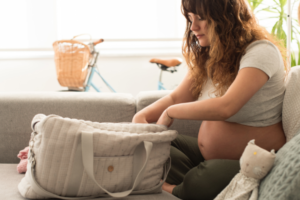
Is your hospital bag ready yet? Start prepping your hospital bag in the early third trimester and have it finalized by your 37th week of pregnancy since your baby could come anytime after the 37th week. Don’t go crazy with packing, though. Pack only the things you will need during your short stay at the hospital. Your hospital bag should include essentials for you, your baby, and your spouse. Don’t forget to include a cute going-home outfit for you and your baby.
15) Finalize your birth plan:
Now is the time to finalize your birth plan. Your birth plan should include details such as the people you want to be in attendance on the day of delivery, pain management preferences such as an epidural, and medical information such as a list of your current medications.
16) Prepare your postpartum kit:
Setting up your postpartum care is essential for a successful recovery. Postpartum care looks different for every momma, depending on if you had a vaginal birth with a perineal tear, an episiotomy, or a c-section. For the first six weeks after giving birth, it is important to take care of yourself in the best way possible to have a successful recovery. Set up your postpartum kit containing all the items you hope will help your recovery. Your postpartum kit should include maxi pads, peri bottle, ice pack, etc.
17) Make arrangements for your other kids:
If you have other children, make arrangements for who will be looking after them when it’s time to go to the hospital. Labor can happen at any time, morning, midday, or night. It’s important to have reliable people who can look after your children when you go into labor. Always have two backups in case the initial person has an emergency and cannot look after your children for you.
18) Stock up on household items:
The first few months postpartum will be hectic. Not only will you be recovering from labor and delivery, but you will be at the beck and call of your newborn, which means you won’t have time or maybe even the energy to make grocery runs. To help you stay focused on both your baby and recovery, stock up on essential household items such as toiletries, toilet paper, laundry detergent, paper towels, and any medicines you might need.
19) Stock your freezer:
Nutrition will play a significant role in your recovery, breastfeeding, and caring for your baby. But because you will be busy recovering from labor and delivery and caring for your newborn baby, making the meals you would usually make may be difficult. That’s why freezer meals and easy side dishes will become your best friend. So go ahead and stock up on your favorite freezer meals, side dishes, and other meals that can easily be whipped together.

20) Stock up your baby’s medicine/remedy cabinet:
Be prepared to deal with any ailments such as fever, cold, or gas-related discomfort that may come your baby’s way by stocking up on fever-reducing medicines, gas relievers, and natural cold remedies.
21) Spend quality time with your children:
Spending one-on-one time with your children before the new baby comes truly sends a meaningful message. It lets your kids know that you love and care about them despite having a new baby on the way.
22) Spend time with your husband:
Once the baby comes, it might be a bit more challenging to spend time with your husband. Take some time now to go on a hot date and spend some much-needed quality time with each other.
23) Schedule a maternity photoshoot:
Now that you’re ready for the baby, if you have the funds to do so, schedule a maternity photoshoot to capture this special moment and your beautiful pregnancy before giving birth.
24) Take a childbirth class:
No matter how many times you have given birth, childbirth can cause a lot of anxiety, especially as you approach your due date. A childbirth class can increase your confidence in your ability to go through labor and delivery and provide you and your spouse with the coping skills you need for a successful birthing experience.
25) Download a contraction app:
To help you keep track of your contractions, so you know when to start heading to the hospital, download a contraction counter app. This app will be helpful, particularly if you plan to give birth at a hospital that is farther away.
Bonus tip: And finally. get some rest. The last trimester of pregnancy is truly exhausting. Try to rest as much as you can before your baby arrives because once baby comes, your hands will be full.
Related article: 5 Exciting Benefits of Having Children
Preparing for Baby Checklist:
- Have your baby shower
- Finalize your baby’s name
- Set up your baby’s nursery
- Prewash and organize your baby’s clothes
- Clean out your car
- Install your baby’s car seat
- Deep clean your home
- Get a free breast pump through your insurance company
- Choose a pediatrician
- Have baby formula ready
- Stock up on diapers
- Prepare for breastfeeding
- Pre register at the hospital
- Prepare your hospital bag
- Finalize your birth plan
- Prepare for postpartum care
- Make arrangements for your other children
- Stock up on household items
- Stock your freezer
- Stock your baby’s medicine/remedy cabinet
- Spend quality time with your children
- Spend quality time with your spouse
- Schedule a maternity photoshoot
- Take a childbirth class
- Download a contraction app
Download Preparing for Baby Checklist
25 Things To Do Before Baby Arrives

